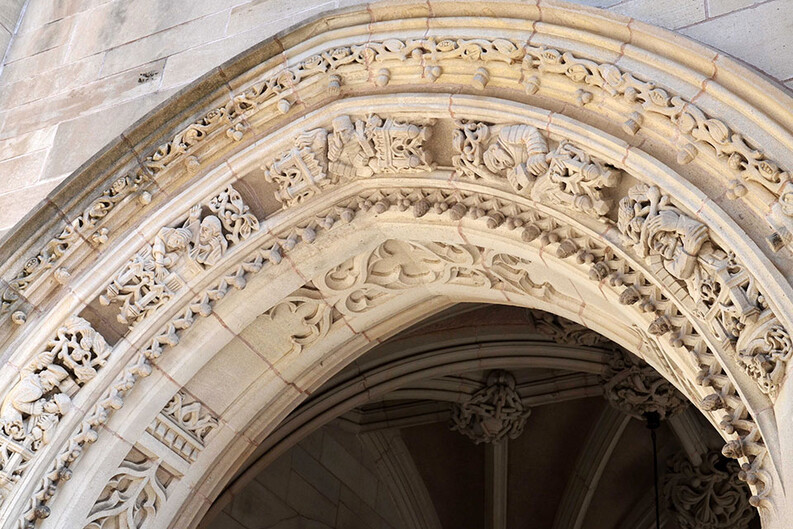FedSoc Conference Honors Justice Thomas ’74

The Yale Federalist Society is hosting a conference titled “Celebrating Justice Thomas: 25 Years on the Supreme Court” on February 10–11, 2017.
“For a quarter century, Justice Clarence Thomas ’74 has shaped the jurisprudence of our nation. Ever since his arrival at Yale in 1971, he has committed himself to developing an unflinchingly principled vision of the law,” said Paul Henderson ’17, chapter president. “As a Supreme Court Justice, he remains unwavering in his defense of the Constitution, faithfully holding fast to what it does—and does not—require. Rising from humble roots to the height of the legal profession, Justice Thomas’s career demonstrates the remarkable potential of a fiercely independent and determined individual.”
The conference will honor Justice Thomas’s accomplished career in public service by bringing together leading jurists, academics, and lawyers to reflect on his contributions to the law. The conference will begin on Friday, February 10, at 3:15 pm with opening remarks from Judge Guido Calabresi (2d Cir.), Sterling Professor Emeritus of Law & Professorial Lecturer in Law.
The first panel, “Justice Thomas and the Administrative State,” will focus on Justice Thomas’s administrative law jurisprudence. Judge Janice Rogers Brown (D.C. Cir.) will moderate the panel featuring Charles J. Cooper, founding member and chairman of Cooper & Kirk PLLC; Philip Hamburger, Maurice and Hilda Friedman Professor of Law at Columbia Law School; Elbert Lin, Solicitor General of West Virginia; and Neomi Rao, Associate Professor of Law and Director of the Center for the Study of the Administrative State at the Antonin Scalia Law School.
The second panel, “Justice Thomas, Liberty, and Equality,” will take place on Saturday, February 11, at 9:30 AM and will explore Justice Thomas’s views on the Fourteenth Amendment, among other topics. Justice David R. Stras of the Minnesota Supreme Court will moderate the panel featuring William S. Consovoy, a partner at Consovoy McCarthy Park PLLC; and Nicole Stelle Garnett, John P. Murphy Foundation Professor of Law at Notre Dame Law School.
The third panel, “Justice Thomas and Executive Power,” will explore Justice Thomas’s views on the presidency, foreign relations, and the separation of powers. Justice Allison H. Eid of the Colorado Supreme Court will moderate the panel featuring Gregory E. Maggs, Professor of Law & Co-director of the National Security and U.S. Foreign Relations Law Program at George Washington University Law School; Patrick F. Philbin, a partner at Kirkland & Ellis LLP; and Saikrishna Prakash, James Monroe Distinguished Professor of Law at the University of Virginia School of Law.
Akhil Reed Amar, Sterling Professor of Law at the Yale Law School, will deliver lunchtime remarks on Saturday at 12:30 PM in the Ruttenberg Dining Hall.
The fourth panel, “Justice Thomas and Criminal Justice,” will explore Justice Thomas’s criminal law jurisprudence. Judge Amul R. Thapar (E.D. Ky.) will moderate the panel featuring Judge William H. Pryor, Jr. (11th Cir.); Marah Stith McLeod, Associate Professor of Law at Notre Dame Law School; Adam Mortara, a partner at Bartlit Beck Herman Palenchar & Scott LLP and Lecturer in Law at the University of Chicago Law School; and Kate Stith, Lafayette S. Foster Professor of Law at the Yale Law School.
The conference will conclude Saturday afternoon with closing remarks by Lillian R. BeVier, David and Mary Harrison Distinguished Professor of Law Emeritus at the University of Virginia School of Law.
Ticketed conference attendees and members of the Yale community are also invited to attend a community reception on Friday evening.
The conference’s complete schedule is available here, and those wishing to register should visit the conference’s registration page. For more details about the conference, please visit the conference website.
The Yale Federalist Society is a group of conservatives and libertarians committed to the free exchange of ideas about law and policy. We host debates and other programming to counterbalance the dominant far-left ideology and foster intellectual and professional development.


